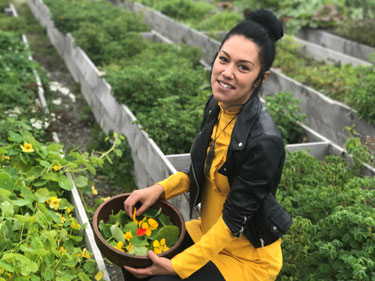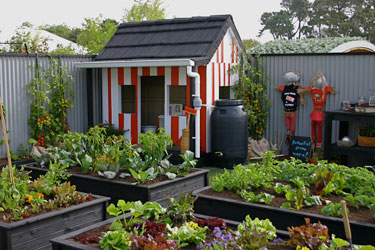Traditional values
Jade Temepara has been feeding her family from her own garden for well over a decade, but her passion for good food and healthy living has taken her way beyond her own backyard.
For Jade Temepara, learning about good food and how to grow it is a way of bringing communities and generations together. In 2010 she founded Hand Over a Hundy, teaching and encouraging people to grow their own food through community connections.
Over many years of home harvests, Christchurch based Jade has also gained skills in cooking and preserving food in innovative ways. Drawing on her wide experiences, she recently founded Kākano, a café and cooking school in Christchurch. Here, her emphasis is on seasonality, basing her menu what’s been grown, foraged, or sourced from local suppliers.
This energetic young mother of five has been a finalist for New Zealander of the Year for her work with families. She has won the NZ Gardener of the year, and is a sought after speaker around New Zealand. She has also tried her hand at garden design and won awards at the Ellerslie International Flower Show.
In November this year, Jade will host a garden plot at the New Zealand Flower and Garden Show in Auckland where she’ll be sharing her knowledge on the best way to grow produce, from garden to plate. She has an inspiring list of leading charitable organisations on board to support her project, including Sustainable Coastlines and the Auckland Women’s Prison.
GG: What is your earliest gardening memory? Has gardening always been a part of your life?
Jade: Picking peas in the garden with my grandfather comes to mind. I was about three or four and would completely devour them as we went along.
I was exposed to the value of nature and gardening from a very young age. Growing up, I spent a lot of time with my greenie grandfathers, both of whom had veggie gardens and were very much men of the land.
GG: You started the community initiative Hand Over a Hundy in 2010, how long had you been creating edible gardens for before this time?
Jade: I had started a couple of years before Hand Over a Hundy, while volunteering for Birthright. While I was there I worked with families to put gardens in their homes. As for my own family, we’ve enjoyed edible gardens together since 2001.
GG: Can you tell us more about the Hand Over a Hundy initiative?
Jade: Hand Over a Hundy has worked with hundreds of families since it first started. It works by sponsoring families to start a vegetable garden with just one hundred dollars. That money gets put into the essentials that they need such as seeds, seedlings, compost and seed raising mix. Each family is partnered with a mentor from their community who is then able to pass down their knowledge of gardening. The challenge is to earn back the money through saving or selling extra produce from their garden and after a year, the family then ‘hand over a hundy’ to another family. The project is about getting communities talking about food – how much it actually costs and where it comes from. We want to build meaningful connections between young families and older generations through sharing the lost knowledge of growing our own food.
GG: For a hundred dollars, what do you suggest a beginner gardener purchases to get started with an edible garden in spring.?
Jade: It really depends on what kind of set up you have at home, such as a raised garden bed, ground level plot, or balcony patio. If we’re going back to basics, all you’d need is a good quality seed raising mix, one bag of compost, seaweed, about $50 worth of heritage seeds, and some seedlings. These essentials will earn you back around $1500 worth of food. It’s good to start simple, vegetables like; tomatoes, salad greens, and broccoli. Radishes grow fast so they are great for gardening with kids.
GG: What vegetables do you suggest people grow if they have limited space?
Jade: Salad mix is always a good option, things like rocket, baby spinach, and mesclun, as well as new potatoes. It’s about using what materials you already have. For example, plant tomatoes in pots or herbs in tyres. Beans make great use of space as they can grow up walls.
GG: With home ownership on the decline, especially among younger kiwis, what do you think needs to change, if anything, to make vegetable gardening more accessible to home renters?
Jade: Movable gardens are particularly good for rentals – I’ve been known to create edible gardens in a wheelbarrow! They’re perfect for moving in and out of shade, wind, and spots to get that extra sunshine.
For bigger projects, it’s about talking to your landlord and working out how you can utilise the space without damaging it.
GG: Based on your experiences with your own five children, what are some of your best ways to engage children in growing food?
Jade: My kids don’t have a choice, it’s all they know! It doesn’t take much to get kids involved but a lot of the encouragement needs to come from the parents.
Make it fun and get them trying things out for themselves. You can paint watering cans or put stripes on the hose and encourage them to make it their own. Give them their own mini garden of strawberries for example, and work with them to take care of their own patch of soil.
GG: You’ve been working on a very traditional form of edible garden, named a food forest, can you tell us more about how this works?
Jade: A food forest is a way of gardening that’s meant to reflect a natural community of plants and animals working together for survival. They can work in a terrace style set up with miniature ‘ecosystems’ placed at different levels to feed and support each other. As a result, food forests are self-sustainable, which means they can thrive without the upkeep that a conventional garden would need, such as watering, weeding, pesticides, fertilisers and so on. It works because it’s been road-tested by Mother Nature.
GG: We are looking forward to seeing you this December at the New Zealand Flower and Garden Show. What can you tell us about your enticingly named project, Tāne Mahuta – God of the Forest?
Jade: The theme of Tāne Mahuta is about taking a few steps back in history to see how Maori have used the land, and how we could bring these traditional practices into the present, as well as the future of gardening.
Our land provides us with so much and our ancestors recognised that by making use of native resources both medicinally and practically. The aim of the project is to follow in their footsteps and sustainably nurture this abundance of natural resources to unite and feed families and communities right in our own backyard.
1-Sep-2017

Jade Temepara

Jade's exhibit garden at the Ellerslie International Flower Show

